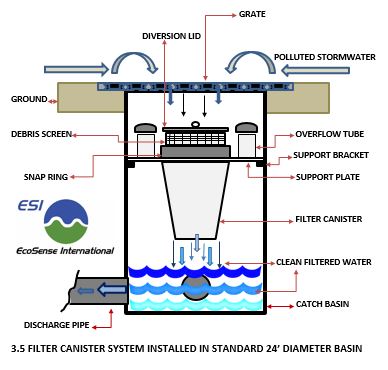
Storm Water Filters Needed for Gulf
. https://ecosenseint.com/products/stormwater-filters-and-debris-systems/

Stormwater Filter Systems: Enhancing Coastal Environments Through Innovative Solutions
Stormwater filter systems play a crucial role in mitigating the environmental impact of urban runoff on coastal ecosystems. These systems are designed to efficiently capture and treat pollutants from stormwater before it reaches rivers, lakes, and ultimately coastal areas. In this article, we will explore how these systems work, their easy maintenance, retrofitting into existing stormwater infrastructure, and real-world examples of their successful implementation.
How Stormwater Filter Systems Work:
Stormwater filter systems utilize a combination of physical, chemical, and biological processes to remove pollutants from runoff. The primary components include sedimentation basins, filtration media, and vegetation. As stormwater flows through the system, sediments settle, and pollutants are filtered out. Advanced systems may incorporate technologies such as hydrodynamic separators, media filtration, and biofiltration to enhance pollutant removal efficiency.
Easy Maintenance:
One of the key advantages of stormwater filter systems is their ease of maintenance. Regular inspections, sediment removal, and filter media replacement are standard procedures. Many systems are designed with easy-access features, reducing downtime during maintenance. Additionally, sensor technologies can be integrated to monitor system performance, providing real-time data for efficient maintenance scheduling.
Retrofitting into Existing Storm Systems:
The versatility of stormwater filter systems allows for integration into existing stormwater infrastructure, minimizing the need for extensive redevelopment. Retrofitting can involve adding pre-treatment devices or installing modular filter units at strategic points within the existing stormwater network. This adaptability makes it cost-effective and practical for municipalities to enhance their stormwater management without significant infrastructure overhauls.
Real-World Examples:
- Green Infrastructure in Portland, Oregon, USA:
Portland has implemented a comprehensive green infrastructure program, including stormwater filter systems. Bioswales, permeable pavement, and tree filters have been strategically installed to manage stormwater. This initiative has not only improved water quality but also enhanced the aesthetic appeal of urban areas. - Sydney Water’s Stormwater Harvesting Scheme, Australia:
Sydney Water has successfully implemented stormwater harvesting, using filter systems to capture and treat runoff for non-potable purposes. This approach has reduced demand on potable water sources and contributed to sustainable water management in the region.
Technical Impact on Coastal Environments:
Stormwater filter systems play a pivotal role in protecting coastal environments by preventing the discharge of harmful pollutants. The reduction of sediment, nutrients, and contaminants entering coastal waters helps preserve marine ecosystems, including coral reefs and estuarine habitats. Studies have shown a significant decline in pollutant concentrations and improved water quality in areas where these systems have been implemented.
Conclusion:
Stormwater filter systems represent a crucial component of sustainable urban water management, particularly in coastal regions. Their effective pollutant removal, easy maintenance, and adaptability for retrofitting make them indispensable in the effort to safeguard coastal environments worldwide. Real-world success stories demonstrate the positive impact of these systems on water quality and underline their importance in building resilient and eco-friendly urban landscapes.



